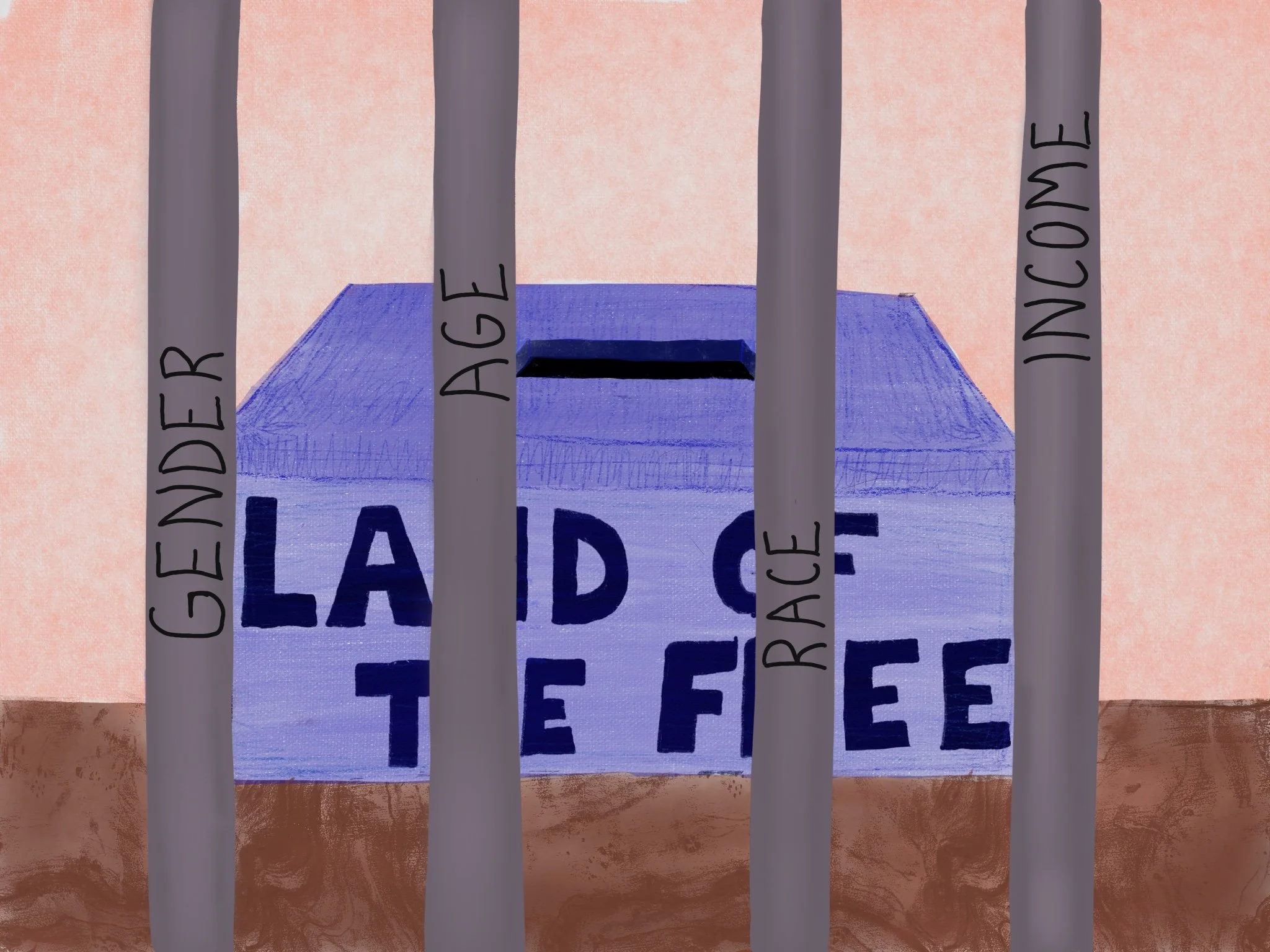Safeguarding Democracy
Article by Marcus Castillo | Art by Jillian Hartshorne
The societal goal, which is social justice, begins with giving each individual an equal chance at an opportunity and presence—something vital for the 2024 presidential election. But America is far from perfect, and there are many issues plaguing our democracy today, including voter suppression.
Recently, we have seen the enactment of stricter voter identification laws, which disproportionately affect racial minorities, senior citizens, and those from low-income backgrounds. These groups might find it harder to obtain the required documentation, making it difficult for them to participate in elections. For instance, in Texas, “the reduction of Black and Hispanic majority congressional districts has been criticized as an attempt to dilute the political power of these communities” (Slatter, J. 5). Such measures create barriers that limit their participation in the democratic process, perpetuating systemic inequalities.
Another issue that needs to be addressed in our democratic procedure is gerrymandering. This occurs when electoral district boundaries are manipulated to favor one political party over another; the voting power of specific groups can be diluted, particularly racial minorities and politically marginalized communities. This practice diminishes fair representation, undermining the democratic principle that every vote should carry equal weight. Studies have shown that gerrymandering leads to “unequal representation and reduces the overall fairness of elections” (Slatter, J. 5). Both major political parties in the United States have engaged in this practice, making it a bipartisan issue that calls for reform to ensure electoral districts are drawn fairly and equitably.
Independent electoral management bodies play a crucial role in ensuring that elections are conducted fairly. Strengthening these institutions helps guarantee impartial oversight of elections, from voter registration to vote counting. Research has shown that “the presence of independent electoral management bodies can significantly improve the quality of elections and reduce the likelihood of electoral misconduct” (Ruiz-Rufino, R. 30). The importance of maintaining the credibility of these bodies cannot be overstated, particularly in the polarized political climate leading up to 2024.
Media freedom is another essential factor in ensuring a fair election. With the rise of misinformation and media polarization, voters are often presented with skewed narratives that favor one political side over the other. A well-informed electorate is key to a healthy democracy, and unbiased reporting ensures voters have the necessary information to make informed decisions at the ballot box. In countries where media is heavily controlled or biased, “the public is often fed a skewed narrative that favors the ruling party” (McAllister et al. 14). Protecting media freedom while addressing the spread of misinformation is an ongoing challenge, particularly in the digital age.
Regardless of where you stand in the political spectrum, these issues must be addressed to ensure our democratic procedure, and the fabric of our country, are just and reliable. Addressing these problems is essential to upholding the principles of equality and social justice. The future of social justice in this country and the world is directly tied to the health of our democracy: as a political system that is transparent, inclusive, and necessary to propel our nation into greater equality for all.
Works Cited
McAllister et al.. "Electoral Integrity and Support for Democracy in Belarus, Russia, and Ukraine." 2015, p. 11, https://doi.org/10.1080/17457289.2014.911744. Accessed 8/31/2024.
Ruiz-Rufino, R.. "When do electoral institutions trigger electoral misconduct?." 2018, p. 30, https://doi.org/10.1080/13510347.2017.1365057. Accessed 9/23/2024.
Slatter, J.. "The Redistricting and Voter Suppression in a Post-Pandemic America." 2022, p. 5, https://doi.org/10.32855/globalinsight.2022.006. Accessed 9/23/2024.
